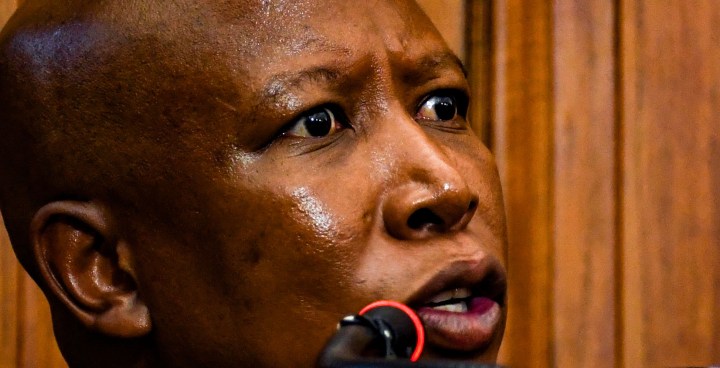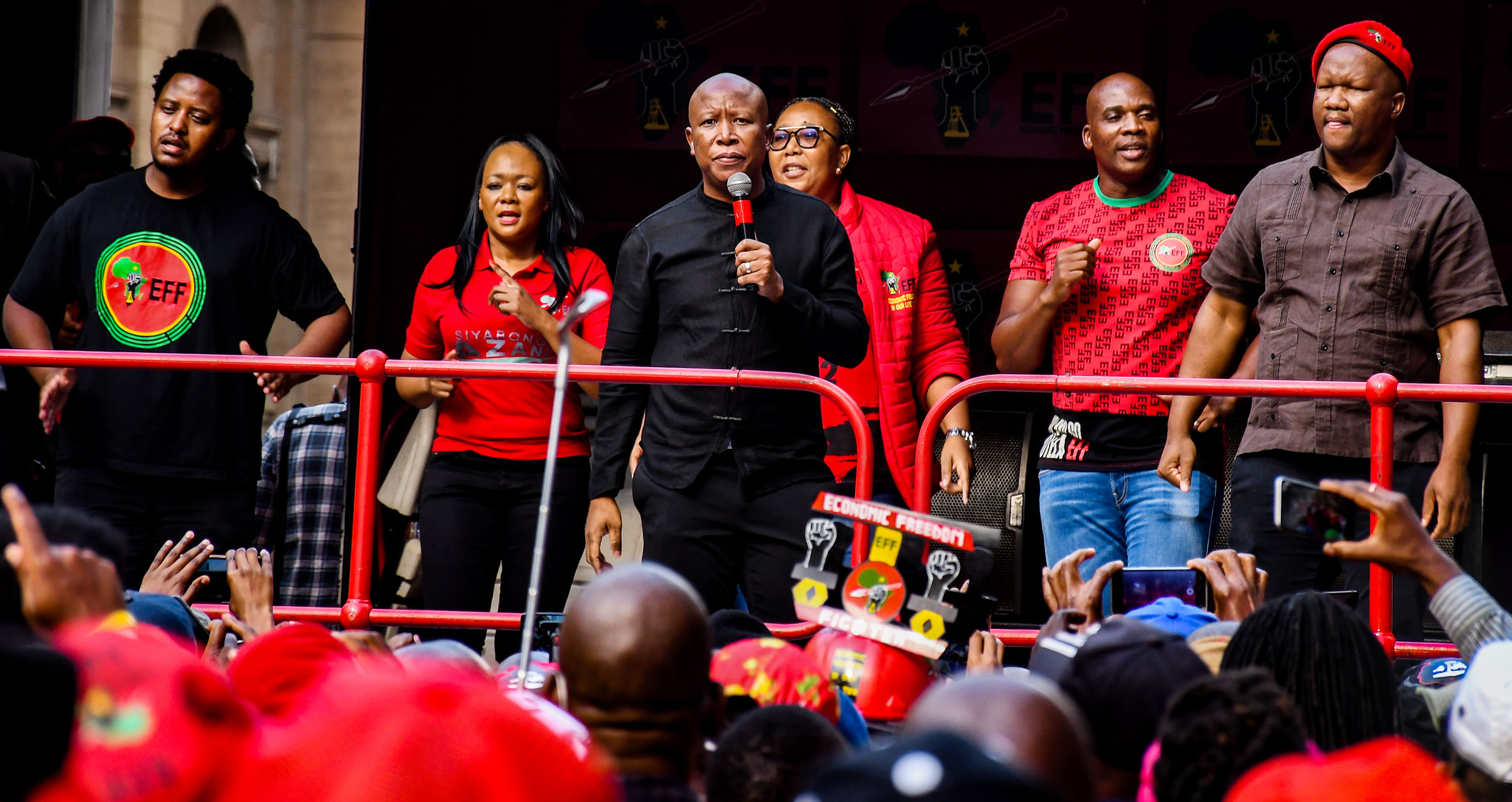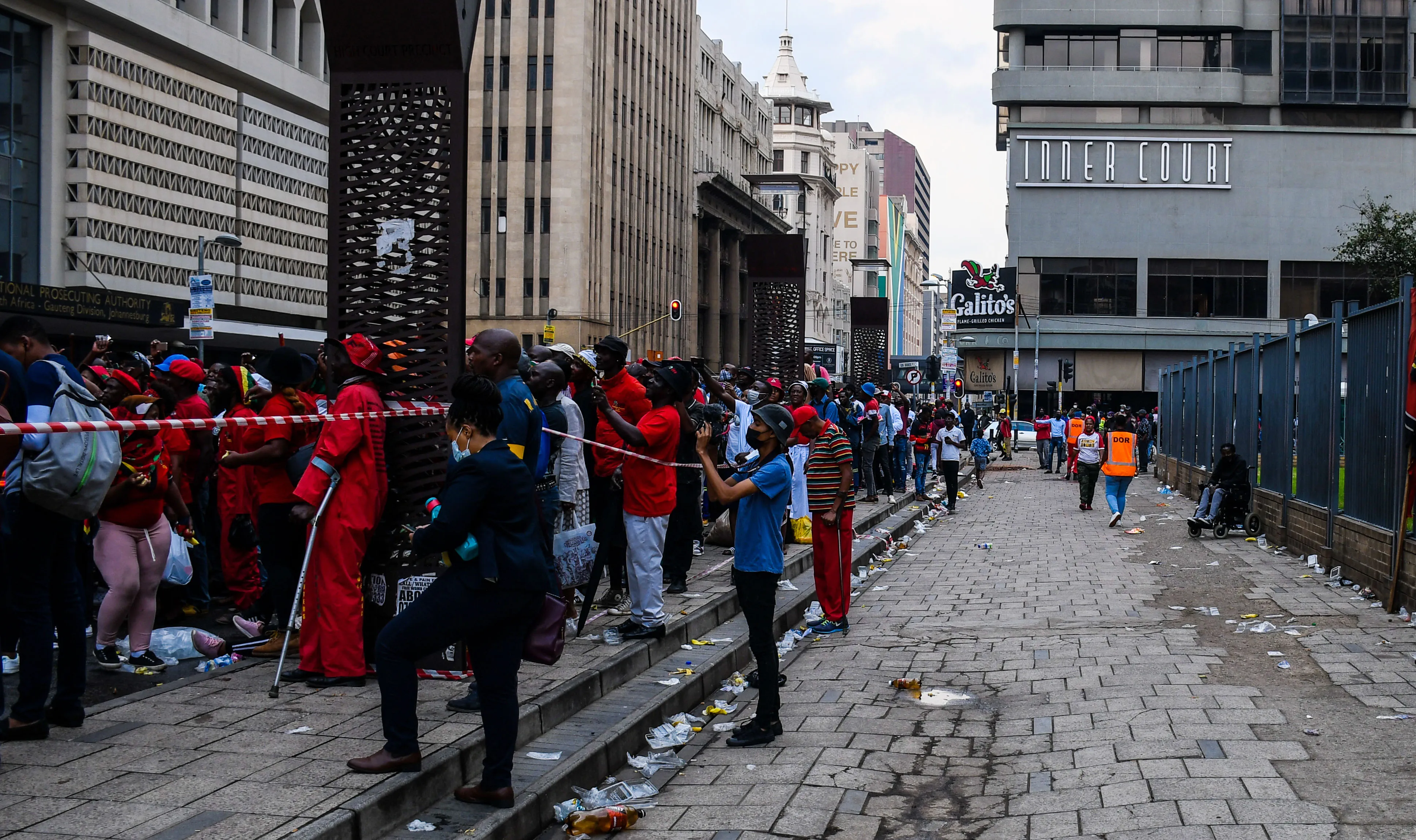HATE SPEECH CASE
Malema and AfriForum lawyer trade verbal blows in high court over the trauma of black South Africans and white farmers

During the ongoing ‘hate speech’ civil case brought about by AfriForum over the singing of ‘Shoot the Boer’ the applicant’s lawyer and EFF leader Julius Malema engaged in a debate of sorts over the trauma of white farmers and black South Africans.
‘Why can’t you take responsibility? Why can’t you for once just say sorry for the crimes you have committed?” asked Economic Freedom Fighters (EFF) leader Julius Malema of advocate Mark Oppenheimer on Thursday.
“Why do you want to become victims, when we are the biggest victims here, when we have lost everything, when we as black people remain a traumatised nation?”
On day eight of the “hate speech” case brought by AfriForum, Malema stood as a witness for the second consecutive day at the High Court in Johannesburg, where he was cross-examined by both his defence and AfriForum’s advocate.
AfriForum first lodged a complaint against Malema, EFF member Mbuyiseni Ndlozi and the EFF party in October 2020 after supporters of the EFF sang Dubul’ibhunu, which translates to “shoot the Boer”*, outside the Senekal Magistrates’ Court during the bail hearing of those accused of murdering Free State farm manager Brendin Horner.
As was the case on Wednesday, Malema emphasised that the Struggle chant “Shoot the Boer/Dubul’ibhunu” is not a command, and the word “boer” or “farmer” doesn’t refer to an individual but represents the system that dispossessed black people of their land.
Malema explained to Judge Edwin Molahlehi that every struggle has to have a face (like the struggle for reconciliation has the face of Mandela), and the struggle for land has the face of a farmer, as they are people that relate to the land.
Malema denied that the song could influence anybody to murder a farmer.
“His [a hypothetical murderer’s] actions will not be inspired by the revolution, but by criminality,” said Malema.
As was the case on Wednesday, Malema used his time on the stand as an opportunity to “teach a class” about his political ideology.
Julius Malema has been granted a grand platform to place his manifesto and display his political and philosophical prowess. To teach a class!
— Xhanti Payi (@XhantiPayi) February 16, 2022
Many people on social media expressed support and respect for Malema.
After listening to Julius Malema’s presentation of EFF policies today in court today. I’m declaring in public that I’m joining the EFF. Thank you Ernst Roets. #EFFvsAfriforum
— KING $BUDA (@skhlatshwayo) February 16, 2022
Oppenheimer and Malema sparred over the injustices and trauma of white farmers and of black people in South Africa.
Oppenheimer read an article from South Africa Today from 2016, taken from Ernst Roets’ book Kill the Boer, often cited in the case – a book Malema said he does not want to touch, as it is tainted with “the blood of black people”.
Oppenheimer read about the case where Alice Lotter (76) and her daughter Helen (57) were tortured to death on their Free State farm in 2009, with graphic detail of the torture and murder of the two women, saying their blood was used to write “kill the Boer” on their homestead.
“What’s your reaction to that?” asked Oppenheimer.
“It’s a criminality – people commit criminality and write whatever they want to write,” responded Malema, bringing up a case where a white farmer tortured and killed a 13-year-old black boy, and asking why Oppenheimer did not cite that case.
After much back and forth, Malema said that unlike the case with the woman, the case involving the young boy was racially motivated and could be considered a hate crime as the white farmer was the one in the position of power.
In the case of the Free State murders, Malema said he could not comment on the power relationship between the torturers and the women because, “We don’t know if they’re farmers, we don’t know their social standing, we don’t know their relationship to the means of production.”
“Now that just shows me how sick and twisted your ideological position is,” said Oppenheimer.
Malema responded, “No, your definition of power is so naive and shallow. I talk power in terms of the relationship to the means of production.”

EFF leader Julius Malema addresses supporters outside the Johannesburg High Court on 16 February 2022. (Photo: Julia Evans)

EFF supporters outside the Johannesburg High Court Gauteng on 16 February 2022. (Photo: Julia Evans)
Oppenheimer said that Malema’s tactic of attributing guilt through groups – not judging people on an individual basis – was “sinister” and not in line with the Constitution.
Malema agreed that he does hold white people as a group liable for the sins of their fathers, justifying this belief with an idiom that roughly translates to, “The children will be punished for the sins of their parents.”
The EFF leader said that white people today are still benefiting from the injustices of the past.
“My brother, when the white people came into government, they didn’t come and take our land individually,” said Malema.
“They took it as settlers, and then pushed us to a land that is not even productive, and made us… stay like sardines.
“And then you come here and want to accuse me, a victim of racism, of being a racist? That is insulting. Madiba coerced us into reconciling with people who we have never been one with. That was a myth. It is unrealistic, you can’t reconcile if you’ve never been together.
“You never came here with an intention to be with us. You came here with an intention to conquer us, and we remain conquered.”
Malema said to the judge that it was unfair to be interrogated by someone who “promotes racism”.
“You know what’s unfair,” responded Oppenheimer, citing the trauma of witnesses who had appeared in this case, white farmers who survived farm attacks and witnessed their family members being murdered.
“That’s real trauma,” said Oppenheimer. “The testimony from them was that when they hear chants like ‘Kill the Boer’, that brings back those memories of real trauma… and you have taken the position… that only your pain matters. That strikes me as a failure of humanity.”
Malema then asked if the trauma of his parents, who picked up the dead bodies of their children in Soweto, was not real trauma.
“I was young when police walked into my mother’s house and she was sleeping. Men took off her blankets… I live with that for the rest of my life,” reflected Malema.
“That is not real trauma, because it’s not white. A black child’s trauma is not a trauma. We are still a traumatised nation if you don’t know.”
Court proceedings continue on Friday when an expert witness in African music and chants will appear. DM
* This article was updated with the correct translation.
















 Become an Insider
Become an Insider
Well, I’ll be surprised if the verdict goes in Afriforum’s favor. Clearly, to me at least, the judge was already pro-Malema. At no stage was he reprimanded. The whole darn judiciary is simply scared of him, hence cases against him are being postponed, postponed, and postponed. Even Ramaphosa in his SONA appeared scared out of his wits of Malema.
Coen – I agree. Every anc cadre is for some reason or another scared of jm.
It’s not about semantics. It’s about intent. Singing such songs cannot possibly be aligned with the goal of a peaceful, inclusive, multicultural South Africa. It can only be intended to enhance division. And division benefits no one ….except unscrupulous politicians. So pushing for such songs makes Julius Malema either unscrupulous or stupid, or both. I have no doubt history will judge him with 20:20 clarity.
Why not just give Malema a farm and see how that works out for him?
He had one, a pumpkin farm. Lost it…
Correction, cabbages…
A question to Malema:
Given the brutal past that we come from, are you committed to building a new, peaceful, non-racial society where all are equal and can prosper?
If he says yes, I believe he would have some trouble explaining how chanting “Dubul’ ibhunu” (“dubula” means “shoot”, by the way, not “kill”) contributes positively to that.
He he says no, he has outed his real agenda.
His harking back to the past brutality that he and other victims have suffered should, of course, be treated with sympathy – not as a ploy, but because it is deserved. But, it can be followed up with a reminder that most of those same black victims, and new black victims, continue to suffer today, not under dominion by another race, but under a criminal black elite, who, amongst other things, steal the meager savings of the desperately poor in schemes such as the VBS saga.
His comment on that would be interesting to hear.
The only thing he’s committed to is himself.
Neither rationality nor morality has any place in engagement with him.
From his early years Malema has openly declared his objectives and methods. He views himself as the true saviour and revolutionary in the vogue of Mugabe, Chavez and Castro. He is also reported as saying: “A decolonisation project requires violence. Colonialism is violent; it’s like racism. And the only way to deal with violence is that you must be violent. Therefore there is nothing wrong in engaging in a revolution.”
Grandstanding events just allow him a larger theatre.
Who is right who is wrong. Both are right both are wrong. Twenty-eight years and we are back to before where we started. The rainbow Nation has lost its rainbow. Will it every return? Not only a sad, sad day, but dark times. Wish the real leaders could emerge.
As long as there is someone to blame, all manner of things can be excused, including corruption, violence and criminality. That is the sad South African story.
I feel somewhat despairing reading some of these comments. One does not have to like Malema (I don’t), or agree with everything that he says or does (I don’t), to also recognise that he is making many, many valid points about the mass trauma and suffering experienced by black people in South Africa. Afriforum may think this case is going well from their perspective; but my suspicion is that it will end up being a significant boost to the fortunes of the EFF – even if the court decision is against them.
Valid points yes, but that adds to the irony of the status quo where the majority of black people in South Africa are once again suffering mass trauma, but this time at the hand of their own elected leaders.
And Malema is one of them, having benefited and continuing to benefit from corruption, where money meant for the alleviation of poverty is squandered on the most extravagant lifestyles for the few, and from scams like the VBS saga, where dirt poor pensioners’ savings were looted by the same scoundrels.
Would that justify the singing of “shoot the Venda” now?
That is of course the case. The old adage “There is no such thing as bad publicity” is Julius Malema’s moniker.
At a broader level – it is nigh on possible for someone with conscience to win a debate against someone with none.
the challenge I have is he’s not addressing the cause of the trauma – he is only addressing his desire for self-aggrandisement
Both sides of the argument have put valid points- the difference is that one of the sides emerges as a probably violent force and that is why so many people on both sides of the divide are terrified of Malema specifically and the party he leads. There is no doubt that he is highly intelligent, and will mobilize whatever means he can.
AfriForum lost the plot. They should have used other means to get their point across (if there is a point). This case is promoting a further gap between the extremist blacks and extremist whites. While Malema sees in farmers the face of land oppression (and gaining support for his fascist political motives), extremist whites will see in Malema the face of arrogant black racism. This can only lead to one thing…someone loosing his head and trying to harm Malema. Whether dead or alive….after such an incident Malema will become a martyr and through that even gain more support and extremist reactions. The best strategy to deal with this thug is to focus on his criminal actions. Take him to court for corruption and theft and make visible the fact that he is as much feasting from the proceeds of crime as the ANC is doing. In other words stealing from the poor.
A disgraceful opportunist who has blood on his hands. He should beware of unleashing the beast – he might just be a victim!
blood on his hands …and his comrades’ money in his pockets.
This guy